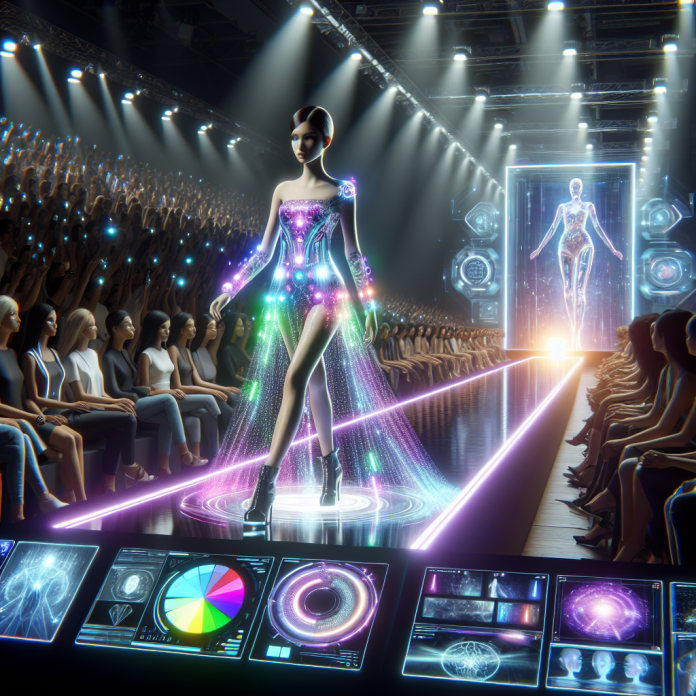The fashion industry is constantly evolving, with trends coming and going at a rapid pace. From haute couture to street style, fashion plays a crucial role in our everyday lives. But what if I told you that the future of fashion is being shaped by artificial intelligence? Yes, you heard that right – AI is transforming the way we approach fashion, making it more innovative, sustainable, and inclusive than ever before.
**Fashion Meets Artificial Intelligence**
When we think of AI, we often envision robots taking over the world or supercomputers analyzing complex data. But in the world of fashion, AI is being used in exciting ways to revolutionize the industry. From predicting trends to personalizing the shopping experience, AI is making its mark on fashion in ways we never thought possible.
One of the most prominent ways AI is impacting fashion is through trend forecasting. Traditionally, trend forecasting was a time-consuming process that relied on intuition and guesswork. But with AI, fashion brands can now analyze massive amounts of data – from social media trends to runway shows – to predict what styles will be popular in the future. This not only helps brands stay ahead of the curve but also reduces waste by producing items that are in demand.
**Personalized Fashion Experiences**
Another area where AI is making waves in fashion is through personalized shopping experiences. Have you ever shopped online and received recommendations for items that perfectly match your style? That’s all thanks to AI algorithms that analyze your browsing history and preferences to suggest items you’re likely to love.
AI-powered chatbots are also changing the way we interact with fashion brands. These virtual assistants are programmed to provide personalized styling advice, answer customer queries, and even recommend outfit ideas. By using AI chatbots, fashion brands can offer a more personalized and efficient shopping experience for their customers.
**The Rise of Virtual Try-Ons**
Imagine being able to try on clothes without stepping foot in a store. Thanks to AI-powered virtual try-on technology, this is now a reality. Retailers are using augmented reality (AR) and virtual reality (VR) to create virtual fitting rooms where customers can see how clothes look on them before making a purchase.
This not only enhances the online shopping experience but also reduces returns and increases customer satisfaction. By leveraging AI and AR technology, fashion brands can offer a truly immersive and interactive shopping experience that blurs the lines between the physical and digital worlds.
**Sustainable Fashion Through AI**
With the rise of fast fashion and its detrimental impact on the environment, sustainability has become a hot topic in the fashion industry. AI is playing a key role in making fashion more sustainable by optimizing the supply chain, reducing waste, and implementing eco-friendly production methods.
AI algorithms can analyze data to optimize production schedules, reduce overstock, and minimize the environmental impact of manufacturing processes. By using AI to streamline operations and make data-driven decisions, fashion brands can reduce their carbon footprint and contribute to a more sustainable future for the industry.
**Inclusivity in Fashion**
In recent years, there has been a push for greater diversity and inclusivity in the fashion industry. AI is helping to make fashion more inclusive by providing solutions for sizing, accessibility, and representation.
One of the biggest challenges in fashion is finding clothes that fit perfectly. AI-powered sizing tools use machine learning to analyze body measurements and recommend the right size for customers. This not only reduces the frustration of trying on multiple sizes but also promotes body positivity by celebrating diverse body shapes and sizes.
AI is also being used to create adaptive clothing for people with disabilities. By using 3D scanning technology and AI algorithms, fashion brands can design clothing that is both fashionable and functional for individuals with unique physical challenges. This is opening up new possibilities for inclusive fashion that celebrates diversity and empowers all individuals to express themselves through clothing.
**The Future of Fashion with AI**
As we look to the future, it’s clear that AI will continue to shape the fashion industry in unprecedented ways. From trend forecasting to personalized shopping experiences, virtual try-ons to sustainable practices, AI is revolutionizing every aspect of the fashion supply chain.
But with great power comes great responsibility. It’s essential for fashion brands to use AI ethically and responsibly, taking into account issues such as data privacy, bias, and transparency. By harnessing the power of AI for good, the fashion industry can create a more inclusive, sustainable, and innovative future that benefits both consumers and the planet.
In conclusion, AI is not just a buzzword – it’s a game-changer for the fashion industry. By embracing AI technologies and leveraging them to create positive change, fashion brands can stay ahead of the curve and lead the way towards a more sustainable and inclusive future for all. So, next time you shop for that perfect outfit, remember that AI may be the fashion-forward force behind it all.

